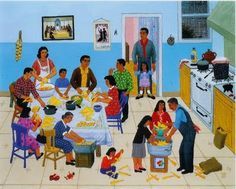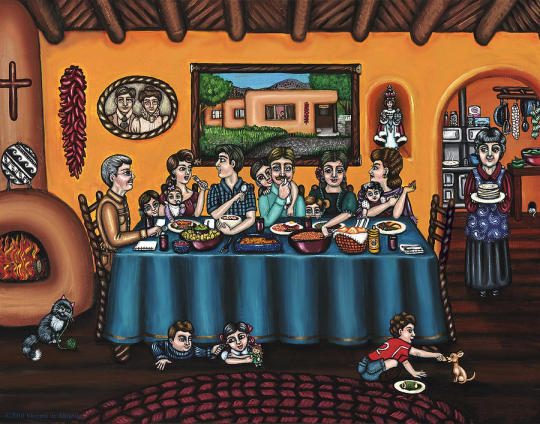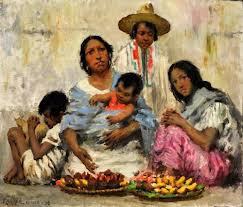Text
A Letter To My Parents
Dear Mami y Papi,
I don't blame you. How can I?
You guys grew up in a small pueblo where small-minded ideas grew and were cultivated.
Ideas that seemed harmless, but were in fact damaging to yourselves. Sort of like pesticide covered roses.
Speaking the language of past generations because it was the only thing that made sense in the machista world you guys lived in.
Phrases like, " Para, no eres niña" or " Como te vas a casar si no sabes calentar tortillas."
As if straying from gender roles were a way of bringing shame to the family. Which, in most cases, it was.
I don't blame you for limiting me for being a woman.
I understand where you are coming from when you say I shouldn't be out late alone or even when you say I shouldn't be alone in a room full of guys.
You're just trying to do your job as a parent to protect your daughter and prevent whatever danger that can come across.
You have lived in a world where women were seen as fragile flowers who needed protecting.
But.
Words passed down generation will be retorted with more liberal views shaped from the world I currently live in.
Phrases that limit me because of my gender will be answered with questions on how it exactly does this shame the family.
Slowly uncovering the hypocritical, illogical layers these phrases were earthed upon.
I know that you see it more protecting rather than limiting. But you can only protect me from so much.
I don't need protection. I need support. When things do get bad, I need to know that you will be there. That's when I will need you the most.
I understand you. All I ask is that you understand me too.
Sinceremente,
tu hija, Nancy.
Basically, this letter is my inner dialogue that I would want to say to my parents, but haven't yet. Even though this is more for my personal reasons, the dialogue can illicit a response from any person who has had clashed heads with their parents. People will relate to this because I believe there is this inner battle of love/hate relationship most people have with their parents. Maybe not my letter, but the concept of understanding both sides of the problem can help make people better advocates for gender justice. Just because you understand something, does not mean that you have to agree with it.
4 notes
·
View notes
Text
AS good as the solutions are, I don't think everyone having a psych major will be the greatest plans. I do believe people should research topics concerning oppression to a group(s), whether it's concerning gender, sexual orientation, or even race. One can be a psychologist and be sexist, or any other bigoted minded-ist, I mean who put those women in the asylums in the first place?? Psychologist need to be treat their patient as a patient, not by their gender/race/social class/etc, but by their mental illness.
Solutions
1. Be an educated psychology major, go to grad school, and be a socially conscious researcher - Having more socially conscious researchers will reduce further social harm done. Hopefully it will stop sexist and racist professionals from trying to pass off pseudo-science as valid.
2. New IRB and APA guidlines please - Reinforce the above solution. Take responsibility and form feminist review boards to reject years of work and thousands spent on some study that just puts women down. Nope. Sorry. You can’t sit with us.
3. Serve, protect, educate, reform(aka let Jess teach Radical Psychology)- Practice psychology feministly, protect patients , educate the public, reform the whole damn field. Stop trying to make it out to be something it’s not. Everyone is a psychologist. All I’ll have over anyone is a degree that says their insurance will give me money to listen when nobody else will or can and revalidate their humanity. Stop playing god to make cash and strip people of their credibility to keep cashing out. The goal is to heal. Heal my women who have oppressed by the whole system.
1 note
·
View note
Text
First of all, I love the tone you have on your posts. I can feel the emotion/anger behind the words. Second, I agree with you on how psychology can be practiced with that Freudian mentality. He may be the father of psychology but it doesn't mean that he was right on everything he wrote/researched. Why do people even get intimidated that a woman can come up with progressive ideas that challenge what is portrayed as the basics of psychology?? Isn't science all about expanding ideas to help understand what's around us for the greater good????
Summary
In summation, there is sexism against women in psychology on so many levels. Mental Health services were founded on the basis of this gendered oppression.. There’s the history of asylums, which were basically lady jails that men used to oppress their daughters, wives, and mothers– oh did I ever mention that sex traffickers LOVED that they could buy girls who were there? Then we have sterilization of those women in bedlam. But Nellie Bly totally ratted on how messed up things were. Fast forward a bit and we have the presence female hysteria. Freud comes in “you’re sad, cuz you want a penis like me” “well damn, if the oppression fits” yknow. Then we had cool ladies like Judi Chamberlain come in and fight mental patient rights.
Currently, we got some sexist research going on and an association of professionals who totally reject feminism because it threatens their career. We CAN practice psychology without Freud. Plenty of people have taken out his sexism and improved on his theories with other, more progressive thoughts on the mind. The APA made PMDD official, thats a female-only diagnonsense that may or may not be super duper threatening to the female population. Eating Disorders exist targeting female gender and influence upon it. Women are getting put into the criminal justice system for probably the same reasons they were in the asylums. It’s pretty cyclical and cynical. Oh and they don’t teach you anything like this in any other at UIC. Even in the cross-listed course. How’s that for intersectionality?
Someone hook me up with a job teaching Radical Psychology please.
2 notes
·
View notes
Text
I like to thank you for researching this topic. I have a connection to this topic because my mother used to work in a factory. Thankfully, she hasn't suffered sexual harassment. However, no person should have to put up with any type of harassment or mistreatment when the workers just want to make the family's lives better. It saddens me how little is publicly known about the exploitation that is happening in our very own country.
Discussion of An Everyday Example
I think the only ones directly affected by this are the immigrant women who come to this country seeking for work and a better life for their families. The only way for us to feel their suffering and exploitation is to research and be aware that this is real. These women are trying to seek certain freedoms in a country that promises that. However, when they arrive they see that their status leaves them with very little options and the only jobs they are able to obtain are those at manufacturing facilities where they work countless hours with very little to no pay. These women are constantly getting threatened with deportation and often sexually harassed, as well as an incentive their managers or supervisors have them believe will grant them favors or higher positions. We as consumers of the products they are making are affecting them indirectly, too. Having holiday season upon us, and living in a materialistic society, we are pushing for more product at a faster rate and this only causes for these companies to vigorously over work their employees. For a garment or toy that cost us thirty or forty dollars they only see a fraction of that.
3 notes
·
View notes
Text
You shed light on something I've never thought of! I am the same as you, thinking that sweatshops were sort of like things only that happen outside of the US. I feel like when the American society buys something made in the USA, it sort of sense of pride comes to mind. I've never thought that sweatshops even existed in the U.S. Goes to show how this topic needs to be more acknowledged and not letting those companies that exploit workers that they can get away with it.
Summary
I have always known that there have been sweatshops around the world making our garments, toys, and gadgets under horrid conditions. Never would I have had thought that those places existed here up until maybe a few years ago. I fell for the tags that said, “Made in The USA” and for trends that told me to buy a certain product without thinking deeper into a problem that is affecting many women. My research was able to give me a better understanding of what these women endure, and sometimes men as well. They are seen as disposable and machines to do a part that many Americans would never do because they would demand for better pay and demand for labor laws to apply.
What has been more captivating and more surprising is the lack of involvement our government has on these issues even when they are aware of them. Policies and regulations aren’t enforced and these big name companies fail to do any sort of inspections because they are more focused on making a profit in time to meet a deadline. Even when inspections are performed I found that many of these manufacturers shut down, but open a different location under a different name elsewhere. The companies who are contracting them are smart and know what they are doing because they demand for low prices, which causes for these contracted manufacturers to cut their employees pay just so they can meet their profits as well. Human trafficking is often thrown in the mix because these facilities contract “recruiters” that are just looking for a cut. They promise these individuals good paying jobs at a price to get them there and the people who fall victims of this end up slaving away trying to pay these high “fees”. These internal and vigorous structures are an indication of how deep and complex this problem can be.
2 notes
·
View notes
Photo
I absolutely agree with you on how we need to have comprehensive education on eating disorders. I would like to add to this education on eating disorders on how we should change the idea that skinny is the “ideal” body type. Many eating disorder revolve around the idea of being thinner or wanting to be thinner. We have to acknowledge skinny does not necessarily equate health, which is what people should also be learning about. Although, I’ve never been diagnosed with an eating disorder, I know my eating habits from when I was younger were not healthy at all.

Solutions for fixing the problem with eating disorders and related issues and preventing future pain from marginalized women needs to involve, of course underlying systemic change to break down oppressions like sexism in accordance with racism and classism. These are the structures that cause pain in the forms of different kinds of traumas that put people at psychological harm, as well as shape psychological unrest into manifesting into this very gendered set of disorders. The factors in creation of eating disorders, on a structural level, must be exterminated alongside the power of the medical system, the devaluation of mental health care fueled by ableism, gender discrimination, racial discrimination, and the crimes of capitalism. The true eradication of violence against women in the form of eating disorders requires a cultural shift.
However, we also exist on the planet today with an abundance of individuals who have already suffered. We cannot write of revisionism/reformism as ineffective and shallow because those who have already been at risk for, are currently suffering from, or are recovering from eating disorders exist and deserve to find comfort and relief. Like any movement, those who are affected the most need to be at the head of the movement. Those who haven’t experienced these disorders or related issues need to take it upon ourselves to fight for their mental freedom so that they can lead a movement based on what they identify as necessary. For example, people need to put pressure on insurance companies to cover eating disorder treatment as they would for schizophrenia or a hip replacement. It needs to be pointed out that not covering care for those suffering from the most lethal of mental conditions is sexist. We need to create safe spaces for women and girls to speak to each other and have access to mental health care, especially women of color and low-income women who are so often left without these vital resources. We need comprehensive education about eating disorders and how to help those who are (or believed to be) suffering. We also need education on structural oppression, and the ways that these issues are large and systemic, not individualistic. We need poor women in recovery to be able to access food that fits in their meals plans as assessed by their treatment team so they can heal. We need to work toward creating environments in which body-shaming and fat hatred is not appropriate and we can explain why. We need to disconnect the terms “fat” and “bad” and “lazy”, especially for women. We need to break down racial stereotypes that hurt women of color and create jokes or myths about their bodies. We need to end the depoliticizing of eating problems and continue to look at factors at the root of the problem. We need WOC-focused feminism.
Photo from HanaBonanza, quote by Ntozake Shange
5 notes
·
View notes
Text
I never really thought that an eating disorder in one country is not exactly viewed like that in another country. I liked the way you made the distinction of how language acts as a barrier when it comes to actually concluding an eating disorder in one culture and something different in another. This reminds me how different cultures have various meals in a day, while in the U.S the typical number of meals are 3. I would like to say I enjoyed reading your blog because it gave insight to various ethnicities.
Ethnocultural identity and eating disorders in women of color.
This article has a great comprehensive breakdown on the incidence of eating disorders and what they look like. It does completely lack the description and analysis of EDNOS (Eating Disorder Not Otherwise Specified), which is the most frequently diagnosed ED. The purpose of this article is to provide a cultural backbone of an understanding of eating disorders, one that clinicians often operate without. The authors propose that eating disorders may be a result of internalized oppression of many intersecting kinds. A literature review on ethnocultural identity and eating disorders show us that there is a relationship between conflicted identity and eating disturbances. It is then not surprising that eating disorders appear in people of layered oppressed identities. The article explains that, until recently, eating disorders were something that occur only in middle and upper class European and European American cultures, but international studies are not researching why we think that and the ways in which we are wrong. Symptomology looks different in other ethnocultural groups, so in many ways, we need to decenter what we think eating disorders are. Authors in Britain noted Black women and Asian women who had many symptoms of anorexia nervosa, but did not have distorted body image. This article goes into detail about whether or not eating disorders present in non-Western and non-wealthy settings occur because of the identity clashing of one’s country of origin and host culture.Women acclimating to new cultures often exhibit symptoms or signs of eating disorders, such as immigrant Latina women newly arrived in Washington D.C.
One study showed that exchange students from Japan in America may learn and form maladaptive eating behaviors and patterns during the period of exchange. Another study examined the incidence of Native American women inclined toward social conformity engaging in and developing eating disordered patterns. Middle class Afro-Caribbean women who adopted a Eurocentric view of beauty were found to be at greater risk of AN. This all shows that problems may rise and create significant risk for eating disorders in a clash of ethonocultural identity and strict definitions and standards of attractiveness put forth by another culture that a woman may experience in one way or another. In accordance with these findings I am starting to view colonization of one’s mind as a primary way that women of color with different ethnocultural backgrounds end up developing eating disorders/problems.
Harris, D. J., & Kuba, S. A. (1997). Ethnocultural identity and eating disorders in women of color. Professional Psychology: Research and Practice,28(4), 341-347.
(Login with my.uic.edu and check out the paper here)
3 notes
·
View notes
Photo

Reflection.
During the process of researching the topic of machismo and Mexican American families, I discovered that it difficult to separate familismo and machismo. In a way, it seemed I was justifying machismo with familismo. That was not my intention. It is difficult to say that the beliefs my parents raised me were oppressive because at the time, it didn’t feel that way. Family values are hard to replace, but along the way I know they are not correct to act upon. However, a sense of betrayal sometimes arises when you reject the machismo beliefs. This is why most teenagers don’t confront their parents to change their ways.
I understand that using traditional values should not be conceived as the “wrong” way of parenting. That, too, was difficult to explain along my research. Traditional values can come from generations and I understand that this can be important to the family structure. However, people need to recognize that traditional beliefs may have work in the past, but they may not work for the present. They should evolve these traditional beliefs to customize it to current times.
1 note
·
View note
Photo

Suggested Solutions.
- Educate at an Early Age.
This can be the most effective way to alleviate the problem of the machismo effect on children, not just in the Mexican-American culture. By providing a sort of education course in school or within the community, children can learn to differentiate the difference of moralistic beliefs created by oneself and what has been taught to them.
- Educate the Parents
Although, it would make more sense to start at the source of the machismo ideas, sometimes it is not a practical one. Parents can be stubborn and they would not want to change their beliefs since they were children. Most don’t realize they are being oppressive because that is the type of mentality they grew up with and that is also how past generations were taught. By providing informative classes in the community, parents can attend these classes and get educated to the wrongs they can be doing to their children. The problem with this is how some parents will be offended and conceive these classes as a way of telling them how bad the parent’s teaching ways are. The classes should point out that it is not on bashing the parenting style in each family, but on how to be a better parent.
- Be Understanding.
To an outsider of the Mexican American culture, the machismo acts are oppressive, it doesn’t necessarily mean the oppressor is saying it with bad intentions. Most times than not, the oppressive acts brought upon the parents is to make one a better person. Granted, not everything parents do is for the better, but most parents want their children to do well in life.
0 notes
Photo

Summary.
The topic of machismo and children is a far reaching discussion. There are so many factors to take in account: social class, gender, age, and quality of parenting. Familismo and machismo needs to be differentiated. A person can be loyal to their family, but not subject themselves to the machismo ways the family may exhibit. Based on the research, I don’t seem to be completely wrong on my assumptions on how most Mexican American families have gender specified roles placed on their children. What I learned is how the Mexican American children are facing oppression, but not even realizing it. It is disguised under the name of parenting. It is common to hear how much fathers and/or mothers limit their daughters but let the sons do more than the daughters, despite the age.
By exemplifying the distinction of being a good parent and being the oppressor of your child, the parent has to come to terms what traditional values are worthy to uphold for the generation of their children. Traditional values are only conceived as wrong when it is used to oppress people. Parents have to change these traditional values to keep with the times and keep in my mind what is best for the child for the world they are currently living in.
1 note
·
View note
Photo

Description of How the Problem is an Intersectional Issue.
The machismo effect on Mexican-American children is an intersectional problem because it does not affect not only gender, but race and culture as well. Machismo may be a word coined in the Mexican culture, but it can be applied to any race, ethnicity, or nationality. Machismo is just a word, but the notion is universal to anyone who has experienced gender oppression. Anyone can be “machistas”, someone who has a sense of masculine pride and puts there ideals to other people. It is not limited to gender. Women can be machistas and not fully understand that they are doing it. In class, we often talk about all the ways one can be oppressed and how there is no clear cut way to avoid/eliminate this oppression. My topic relates to this discussion in how instead of talking about what already happens every day, we should be educating children at an early age basic respect for everyone.
Even though my topic is specific to Mexican American children, there is no age to learn machista ways. The issue I’m trying to bring forward is how we are taught machismo at an early age and we defend it as “that’s how I was raised, I don’t know any other way.” We should change this mentality. Just because one grew up with machista beliefs does not mean one should continue and pass it along to their children.
1 note
·
View note
Photo

Discussion of an Intuitional Example
The public education is affected by the machismo effect on Mexican American children. Mexican American children are expected to do well in school, but don’t because of the lack resources and family background they may have. From personal experience, my parents were only able to help me in school until the 5th grade. My father has only a high school education while my mother has only elementary education. They are also immigrants and don’t really interact with the community. So, it would have to be up to me to take charge to better myself in my education. I’m not the only one. Friends and family with immigrant, not just from Mexican American culture, often talk about the struggle to keep with school and get the grades their parents expect of them. The public educations doesn’t really recognizes this and this needs to change. In the 2nd scholarly source, the study talks about the levels depression the children have because of their family background. With this research and amongst others, the public education needs to recognize that Mexican American children are students in need of help to better educate themselves and have the same opportunity at success as the rest of the nation.
1 note
·
View note
Photo

Discussion of an Everyday Example.
From personal experience, my family still has this machismo mentality. My dad would be the provider while my mom was the caretaker. My sister and I were the only girl until 5 years ago my brother was born. Growing up, I always knew my dad wanted a boy. So, when my brother was born I can see how my dad would be now that he has a son. The moment he knew my mom was pregnant with a boy, but my dad gleamed with pride. He would say how much he will teach him about things he never has taught me to this day, such as doing an oil change for a car. Even though I’m the oldest, my dad only wants me to do well in school and do the chores in the house. He never had higher expectations for me. My brother is going to be successful in my father’s eyes. These different views exhibit the machista ways I have encountered growing up. This can be backed up by the scholarly sources I have researched, specifically in the article, Siblings’ Differential Treatment in Mexican American Families. Although, it is quite common amongst my Mexican-American families. Family and friends have told me countless of stories on how, not only would the father oppress the children, but as well as the mother. Although common, it is not discussed among families because it is not seen as an issue but more of a commonality
2 notes
·
View notes
Photo

Analysis of Second Scholarly Source.
In the article, Siblings’ Differential Treatment in Mexican American Families, an experiment was presented to 246 two-parent Mexican American families to examine “two cultural phenomena, parents’ cultural orientations (i.e., involvement in Anglo and Mexican culture) and adolescents’’ familism values (i.e emphasizing loyalty, support, and interdependence among family members) given their relevance to two distinct aspects of differential treatment dynamics within the families.” (McHale, UpdeGraff, Shanahan and Crouter,& Killoren, 2005). The goals of this experiment is to determine how the parents’ cultural background does determine how they treat their children, specifically if gender plays a role, and how the children’s’ familism values affect their lives within the family.
The experiment consisted of interviews that focused on 7 categories: Parent’s differential treatment, parents’ enculturation/acculturation, familism values of adolescents, adolescent’s depressions symptoms, adolescents’ risky behavior, parental acceptance, and parents’ fairness. (McHale, 2005). Each family had to rate each question from each category of a scale of 1-5. The result turned out that families that favored the Mexican culture more had showed more gender-specified treatment. The researchers found out the older siblings would get the most responsibilities and, if they were female as well, they were expected more from them. The experiment took account the social classes and the diversity that Mexican American culture is.
The study indicates that machism is alive and well in the Mexican American households. Unlike the study mentioned in the Analysis of the First Scholarly Source, this study goes more specific in the gender and age of the children. I agree on how gender and age play an important factor in the Mexican American family structure. I am the oldest of my siblings and a female. I can attest to everything that this study has presented. It is expected of me to set the example for my siblings and for me to maintain in the gender specified role I have in my family. A part of the study that I found interesting is how they pointed out how the quality of a family should be accounted for. I believe that is important to note because, even though the oppression the children face, does not mean the children are being mistreated and abused. The upbringing one may have experienced does not indefinitely determine how the person will become.
Article
0 notes
Photo

Analysis of First Scholarly Source.
In the article, The Familial Socialization of Culturally Related Values in Mexican American Families, a research study was conducted to “examine a model suggesting that Mexican American mother and fathers born in Mexico are more likely to endorse Mexican-American values and engage in more ethnic socialization of their young adolescents.” (Knight et al., 2011). To be able to further comprehend the relationship of ethnic identity and ethnic socialization, the study consisted of 750 Mexican American young adolescents whose families all consisted of a mother, but only 62.3% of them had a father present.(Knight et al., 2011) The participants all came from different social classes. The procedure consisted of computer assisted interviews at the privacy of the families’ homes and the interview lasted 2.5 hours long.
The way that the researchers were able to determine the values each family had they used a program called the Mexican American Cultural Value Scale (MACVS). (Knight et al., 2011)It had 5 categories: Familism-Support, Familism-Obligation, Familism-Referents, Respect, and Religiosity. Each category had a scaling system from 1 (not at all) to 5 (very much) to respond to the questionnaires in each category. The participants were all interviewed separately and gender was factored in the experiment. It was concluded that mother was the person who had a greater influence at the development of the adolescent’s identity was the mother.
When people hear machismo, one usually thinks of the father of the family facilitating this notion. However, based on the evidence of the study the machista ways are more likely to be formed from the mothers. Although the research was not conducted considering the factor of machismo, it can be assumed that most Mexican traditional values have machista tendencies. Therefore, when the study talks about ethnic identity development or family values, machismo is inherently involved.
When I learned about the mother being the perpetrators of the development of ethnic identity, it didn’t really come as a shock. Based on personal experiences, the mother is the teacher and the caretaker. My mother had the patience to tolerate whatever help I needed. So, what I learned was taught by my mother. I believe many can relate to this because, if one grows up in a Mexican-American family, the mother usually knows everything; and if she doesn’t your last resort would be the father. The study does support my family’s circumstances, but there is some discrepancies. For example, the addition of families with no father makes the results more in favor to the mother rather than the father. There is no right answer to who can be the one that can help create the identity of a person.
Article.
2 notes
·
View notes
Photo

Analysis of a Web Source.
Family Traditions: Familismo
by Nancy Q.
Mexican culture is often not follows the stereotypical general structure of a family. A father being the provider and the mother being the caretaker, and the children following the footsteps of their parents. In the article, Mexican Family Culture, Michele Meleen writes about this structure but in respect to the Mexican culture.
The defined roles in a Mexican family is quite typical and doesn’t stray from the usual structure of any other family. However, Meleen explains how there is this sense of familismo that overshadows the Mexican family structure. She defines familismo as “the value of family over individual needs.” This, along with a strong national pride, creates contributes to the family values that needs to be upheld. Meleen includes in her article how the ideals of relating to the family is shapes their religion and politics. That is not to say, every Mexican family is like this. Meleen comment on how even though as Mexican families are evolving to break the stereotypical roles, the Mexican family ideals are so ingrained that it is difficult to uproot the Mexican family traditions.
All in all, I agree with Meleen in many aspects. Being raised in a Mexican family household, I related to a lot of what she wrote. Familismo is a big aspect of growing up. What you did outside of the house is what represented the family. If one fails, we all fail. I have caught myself not doing things because of this mentality of how it would affect my family if I did this. Whether this is right or wrong, it is hard to say. What is well known is that Mexican family traditions are not so easily forgotten.
Michele Meleen's Article.
0 notes
Photo

Introduction.
An issue that needs to be realized and resolved is the issue of machismo. In more specific terms, machismo and its effect on Mexican American children. These families, especially those with immigrant parents, have experienced some sort of machismo that practically molds most children’s lives. This is a problem because the social gender roles Mexican American children are raised with will later have a great effect on how they will be in the future. Children are constantly learning and for them to learn about oppressive ideas and the negative effects it can cause can prevent sexism.
The relevance of this issue is based on how many Mexican American families reside in the United States. This issue is close to home for me because I am a Mexican American that grew up with the gender norms that most Mexican American children most likely grew up with. By shining light to this particular issue of gender oppressiveness, machismo can soon not be considered as a social norm.
-Nancy Q.
To find out more about this topic, click here
7 notes
·
View notes